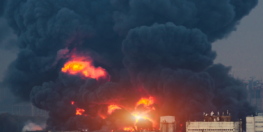
A natural gas pipeline explosion at the Port of Corpus Christi in August killed four members of a dredging boat crew and put six more people in the hospital with serious burn injuries, according to published reports.
An Associated Press report from August 24 depicts the huge fireball that erupted when the dredging vessel Waymon L. Boyd struck a submerged propane pipeline.
“Of the six injured, five were airlifted to a San Antonio hospital for severe burns while another was expected to be discharged,” Sean Strawbridge, CEO of the Port of Corpus Christi, told The AP. Three crew members with burn injuries were taken to San Antonio’s Brooke Army Medical Center (BAMC) to receive specialized treatment for burns, KRIS 6 News reported.
The explosion occurred just after 8 a.m. in the Corpus Christi Ship Channel’s Inner Harbor south of Nueces Bay. The fire ignited the dredge and spread from the pipeline to a nearby grain elevator.
According to the Coast Guard, “the fire onboard the vessel was first extinguished Friday afternoon, but re-ignited and was finally put out at approximately 10 p.m. Friday, shortly before the vessel broke apart and sunk.”
A news release from the Port of Corpus Christi says approximately 1,600 gallons of diesel fuel were removed from the water and an additional 680 gallons of diesel fuel/water were skimmed from the surface of the harbor the night after the accident.
The cause of the accident remains under investigation.
Explosions and Burn Injuries
Burn injury patients flown to Brooke Army Medical Center in San Antonio from the Corpus Christi pipeline explosion received some of the best burn injury care available in the world. BAMC is home to the U.S. Army’s Institute of Surgical Research Burn Center, the Army’s sole facility caring for burn injuries among active duty servicemen, beneficiaries and civilian emergencies.
The USAISR Burn Center’s 300 medical professionals provide care that includes cutting edge surgical services and promotes optimal recovery, restoration of function and community reintegration.
An explosion can cause a variety of injuries, including blunt force trauma among individuals hit by the blast wave. These injuries may include traumatic brain injury, broken bones, internal organ injury and deep lacerations caused by debris sent flying by the force of the explosion. The heat of the blast and flash fires that often accompany an explosion can cause serious burns and may even sear the lungs of people nearby. Smoke inhalation can cause pulmonary injury.
The USAISR Burn Center focuses on patients with the most severe burns requiring critical care, rehabilitation, wound care and long-term reconstruction.
Patients treated at the Center are individuals who have suffered:
- Second-degree burns, also known as partial thickness burns, covering more than 10% total body surface area.
- Third-degree burns.
- Burns that involve the face, hands, feet, genitalia, or major joints.
- Electrical burns, including lightning injury.
- Inhalation injury.
- Burns and trauma (such as fractures) in which the burn injury poses the greatest risk of mortality.
Second-degree burns affect the skin and the underlying layer of skin known as the dermis. When a second-degree burn covers more than 10% of the body, it is considered a moderate or severe injury. Third-degree burns, also known as full thickness burns, affect deeper tissue and may result in charred skin and damage to nerves. Patients with third-degree burn injuries require surgery, skin grafts and special care.
Even with the skilled care, serious burn injuries can prove fatal. Severely burned patients may eventually succumb to infection due to the loss of skin or to pulmonary complications, such as pneumonia. Those who survive may have disfiguring scars that cannot be repaired. Badly burned limbs may require amputation.
A serious burn victim may be totally disabled and require assistive or adaptive mobility devices such as wheelchairs or prosthetics and have ongoing medical treatment and personal care needs.
Burn Injuries and Offshore Work in Corpus Christi
There are multiple federal laws that protect workers injured on boats and other vessels due to someone else’s negligence or carelessness. They allow the injured worker or survivors of offshore workers killed in accidents to obtain compensation for medical costs, lost income and pain and suffering. Among them are the:
- Jones Act, which allows seamen to seek compensation from their employer if negligence on the part of their employer or another crew member causes their work-related injury.
- Death on the High Seas Act (DOHSA), which allow a seaman’s survivors to obtain compensation from responsible parties if the seaman’s death was caused by negligence, default or wrongful act on the high seas, which is defined as waters “a marine league,” or one-twentieth of a mile, from shore.
- Longshore and Harbor Workers Compensation Act (LHWCA), which provides workers’ compensation benefits for maritime workers who are not seamen. This allows stevedores, workers who load and unload ships, and other shore workers to obtain compensation if they are injured while on the job.
The Jones Act and other federal maritime laws are complex so that they may cover multiple potential factors and accident scenarios. Unfortunately, claims pursued by injured workers can become complicated if employers seek to limit responsibility for their workers’ well-being or if responsibility for an accident is not clear.
From our offices in Corpus Christi, the maritime accident attorneys at Herrman & Herrman, P.L.L.C., represent workers who have been seriously injured in workplace accidents offshore or on land. We have more than two decades of experience helping injured clients and the families of fatally injured workers pursue compensation claims, including those involving the Jones Act and other federal causes of actions.
If you need any information about your rights pertaining to the Corpus Christi pipeline explosion or another maritime accident, please contact a maritime accident lawyer at Herrman & Herrman. Our attorneys offer a free, confidential initial consultation to discuss your legal options. If we can pursue a claim on your behalf, we will not charge a fee unless we recover compensation for you. Call us at (361) 882-4357 today for experienced legal help.








